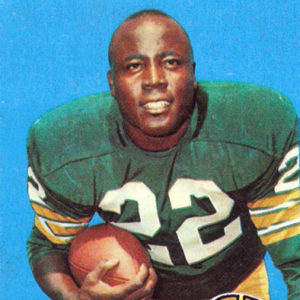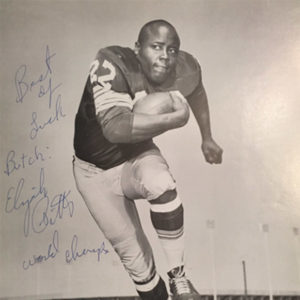calsfoundation@cals.org
Elijah Eugene Pitts (1938–1998)
Elijah Eugene Pitts was a football player who grew up in Mayflower (Faulkner County), played at Philander Smith College, and starred for the Green Bay Packers in the first Super Bowl. He was one of the early Black stars of the National Football League (NFL) from the segregated South and had a long career as a player and a professional coach.
Elijah Pitts was born on February 3, 1938, one of two sons of Samuel and Gertha Pitts, who were sharecroppers on land near Mayflower. Since there was no nearby school for African Americans, he attended the Pine Street School in Conway (Faulkner County), which Black children from Conway and surrounding communities attended before the schools were integrated in 1968.
In high school, Pitts was the star halfback for the team, and at halftime he removed his pads, put on a dry T-shirt, and played trombone or tuba during the band’s halftime show. The small school played teams like those from Stamps (Lafayette County) and Prescott (Nevada County) instead of the larger African American schools, but he nevertheless received scholarship offers from Illinois, Wisconsin, Michigan State, and other schools outside Arkansas that allowed African Americans to play. He chose instead to enroll at Philander Smith College in Little Rock (Pulaski County), following in the footsteps of his brother, Sam. At Philander, he met Ruth Bellinger, and they married in 1962 when he came back to the college to complete his bachelor of science degree in education following his first season as a professional. They had two sons and one daughter.
Philander Smith also played only small Black schools, but Pitts’s reputation spread. The Green Bay Packers obtained a film of a game from Arkansas Agricultural, Mechanical and Normal College (now the University of Arkansas at Pine Bluff) in which Pitts ran and caught a number of long passes. The Packers drafted him as the 180th pick in the professional draft in 1961. The Boston Patriots of the fledgling American Football League offered him $2,000 more than did the famous Packers, but Ruth Bellinger urged him to try out for the Packers, widely viewed at the time as the greatest team in football. He joined the Packers that fall under the legendary coach Vince Lombardi. Philander Smith ended its football program three years later.
For several years, he played behind Paul Hornung and Jim Taylor, who would make the Pro Football Hall of Fame, but he was the prototype Lombardi player: smart, versatile, and durable. He carried the football, passed, caught passes, was a ferocious blocker, and returned punts and kickoffs. He was such a punishing tackler that Lombardi made him captain of all the special teams.
The Packers dominated professional football that decade behind quarterback Bart Starr, Hornung, Taylor, and Pitts. The team won four NFL championships and the first two Super Bowls. Pitts scored thirty-five touchdowns in nine seasons at Green Bay and three in post-season playoffs.
His greatest moments came in the first Super Bowl on January 15, 1967. With Hornung sidelined, Starr, Pitts, and substitute receiver Max McGee carried the day. Pitts rushed eleven times, caught two critical passes from Starr, returned punts, and played on the special teams. He scored two touchdowns in the second half as the champions of the NFL defeated the Kansas City Chiefs, who were the American Football League champions, 35–10. As a tribute to his play, the cover of the Packers’ 1967 guidebook carried a picture of Pitts running behind the blocking of All-Pro guard Fuzzy Thurston. The cities of Little Rock and North Little Rock (Pulaski County) declared Elijah Pitts Day and held a parade in his honor.
Pitts later played briefly for the Los Angeles Rams, Chicago Bears, and New Orleans Saints before beginning a coaching career. He was an assistant coach for several American and Canadian teams, but, for most of his career, he was an assistant head coach for the Buffalo Bills. He coached the team in four Super Bowls. He briefly served as the head coach when Coach Marv Levy fell ill.
African Americans were rarely considered for head coaching jobs, but Levy said Pitts ought to have been a head coach, describing Pitts for the Buffalo News in 1989 as “a superior on-the-field teacher, who gets along magnificently with everybody else on the staff and yet can assert himself, and who’s tremendously respected by his coaching colleagues and all of the players on the team—white players and Black players.” Bart Starr called Pitts “one of the greatest gentlemen I have ever known.”
Pitts had a commanding baritone voice and a sweet disposition, but his coaching philosophy came from Lombardi. Fatigue, he told players, is cowardice. He was asked once if the intimidating Lombardi had scared him the first time he heard him. Pitts responded, “He scared me the last time I heard him.”
Pitts was inducted into the Green Bay Packers Hall of Fame in 1979 and, the next year, into the Arkansas Sports Hall of Fame. Pitts and his wife were honored in 1997 for their longtime support of Black colleges at the annual dinner of the United Negro College Fund.
Pitts died on July 10, 1998, in Buffalo, New York, of cancer. His body was cremated, and the family kept the ashes. In 2017, he was inducted into the inaugural class of the Panthers Hall of Fame at Philander Smith College.
For additional information:
Bailey, Jim. “Big Ten Mined Arkansas Fields for Black Talent.” Arkansas Democrat-Gazette, November 27, 2001, p. 3C.
———. “Old Pro Pitts Makes the Right Choices.” Arkansas Democrat-Gazette, May 11, 1996, p. 2C.
Brady, Karen, and Tom Ernest. “Bills’ Assistant Head Coach Elijah Pitts Dies of Cancer.” Buffalo News. July 11, 1998, p. 1B, 3B.
Goldstein, Richard. “Elijah Pitts, Star Back for Storied Packers.” New York Times, July 11, 1998, p. 9A.
Ernest Dumas
Little Rock, Arkansas
 Recreation and Sports
Recreation and Sports Elijah Pitts
Elijah Pitts  Elijah Pitts
Elijah Pitts 




I am the niece of Gertha Potts, whose maiden name is Cunningham. So I know that I am related. Her brother Calvin is my father.
I think I may have been related to Mr. Pitts. My father is the late Sam G. Burns. His father is Sam G. Burns Sr., now deceased.
I had the pleasure of knowing this man when we were young men. In the summer of 1967, he and I were at Camp McCoy,Wisconsin.
I have a picture with Elijah and another one of the teammates, Lionel Aldrich.
I have fond memories of these wonderful men.